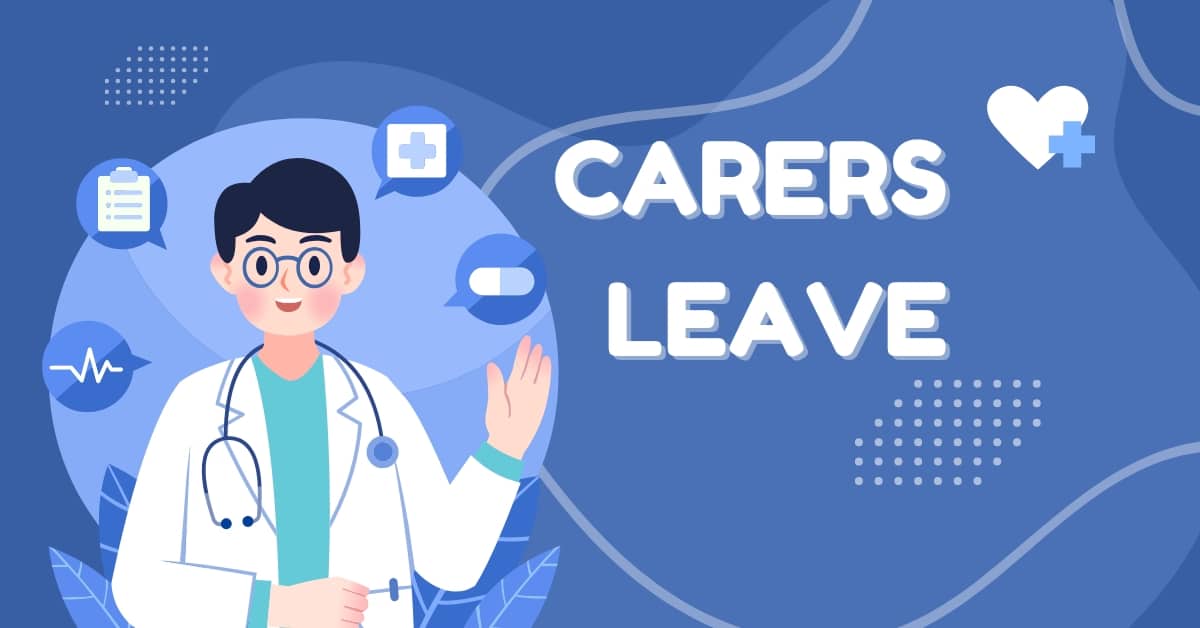Caring for yourself or a loved one in a time of need shouldn’t come at the expense of job security. Thanks to the National Employment Standards (NES), Australian employees have access to personal/carer’s leave to support their health and well-being when life happens. But what exactly are you entitled to, and how does it work?
This guide breaks down everything you need to know about carers leave in Australia, including eligibility, entitlements for different types of employees, required evidence, and common situations when leave can be taken.
What is Carer’s Leave?
Personal/carer’s leave is a key provision under the National Employment Standards, which sets minimum workplace entitlements for Australian employees. This type of leave allows workers to take time off to recover from illness or injury or provide care and support to an immediate family or household member who is unwell, injured, or facing an emergency.
The goal of this entitlement is simple yet impactful—it ensures employees don’t have to choose between their loved ones’ well-being and their job security. Read more about What is Carer’s Leave? in our blog post.
Paid Carer’s Leave—Eligibility and Entitlements
To access paid personal/carers leave, an individual must be a full-time or part-time employee. Here’s how it works for eligible employees:
- Entitlement: Full-time employees are entitled to 10 days of paid carer’s leave per year, while part-time employees accrue leave on a pro-rata basis based on their hours of work.
- Accrual: Leave accrues progressively, starting from the first day of employment.
- Use in Part or Whole: Employees can use the leave in part-day increments or as full days, depending on their needs.
- Carryover: Any unused carer’s leave rolls over to the next year, giving employees a safety net of accumulated leave if needed.
- Protected Entitlement: Personal/carer’s leave is a “protected” entitlement under the Fair Work Act. This means an employer cannot take adverse action against an employee for appropriately availing their leave.
What About Casual Employees?
Casual employees are not entitled to paid personal/carers leave. However, they aren’t left completely out in the cold. Under the NES, casual workers can access unpaid carer’s leave when necessary.
- Entitlement: Casual employees are entitled to 2 days of unpaid carer’s leave per occasion where care or support is needed.
- Job Security: This entitlement ensures casual workers can manage emergencies without jeopardizing their jobs.
Employers may request evidence to support a casual worker’s leave claim.
Situations Covered by Carer’s Leave
Carers leave is designed to cover a range of situations where your presence is required to provide care. Here are some common examples of when it can be used:
Illness or Injury
If an immediate family member or household member falls ill or is injured and requires care, employees can utilise carer’s leave to be there for them during difficult times.
Medical Appointments
Carer’s leave can be used to attend medical consultations or follow-ups for dependent family members, helping to prioritise their health.
Emergencies
Unexpected emergencies, such as a family member’s sudden hospitalisation or an urgent health-related incident, are valid reasons to apply for carer’s leave.
Ongoing Support
Employees may need to provide ongoing or long-term care for a family member with a chronic illness, disability, or recovery from surgery.
It’s important to check the specific circumstances outlined in your employment agreement or relevant industrial award, as some details might differ.
Providing Evidence for Carer’s Leave
Employers may request reasonable evidence to confirm the legitimacy of a carer’s leave request. Here’s the type of evidence commonly accepted:
Medical Certificate
A certificate from a healthcare professional attesting to the family member’s health condition and their need for your care.
Statutory Declaration
A signed statement affirming your need to provide care can also be submitted, especially if obtaining a certificate isn’t feasible.
When submitting evidence, ensure it’s genuine and accurate. False or misleading claims may lead to serious disciplinary action.
For convenience, organisations like OnCare Health offer online services to help employees quickly obtain personal or carer’s leave certificates with minimal hassle.
Key Questions About Carer’s Leave
Who Qualifies as a “Family Member” for Carer’s Leave?
“Family members” typically include immediate relatives such as a spouse, de facto partner, child, parent, grandparent, sibling, or even in-laws. These definitions may vary slightly across workplaces, so it’s best to confirm with your HR department.
Can I Use Carers Leave for Non-Emergency Medical Needs?
Yes. Scheduled appointments for family members, such as regular check-ups or therapy sessions, are valid uses of carer’s leave. However, you should clarify with your employer to ensure compliance with the company’s policy.
What Happens If My Carer’s Leave Is Exhausted?
Once you’ve used up all your carer’s leave, you may discuss with your employer to access other forms of leave, such as annual leave or unpaid leave, depending on workplace policies.
Can Part-Time and Casual Employees Access Carers Leave?
Yes. While part-time employees accrue leave on a pro-rata basis, casual employees have access to unpaid leave for qualifying situations.
What If My Employer Requests Evidence?
It’s your responsibility to provide valid evidence, such as a medical certificate or statutory declaration. OnCare Health can help you secure this quickly and efficiently online.
Why Carer’s Leave Matters
Personal/carer’s leave is more than just a workplace entitlement—it’s a lifeline that allows employees to balance their professional responsibilities with personal priorities. By knowing your rights and options, you can make informed decisions about how to best manage these critical moments.
If you find yourself needing carers leave in a time of uncertainty, remember that it’s not just a policy but a fundamental way to ensure your work-life balance remains intact, no matter what life throws at you.

